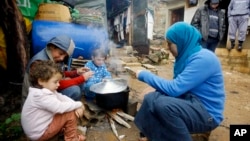A shortfall in funding from international donors has forced the UN’s World Food Program to suspend giving crucial food vouchers to 1.7 million of Syria's most destitute refugees, the agency announced Monday, warning that families will find it tough to survive the winter.
The agency warned for months it would face a cash crunch towards the end of the year; it needs another $64 million to continue feeding throughout December refugees in Jordan, Lebanon, Turkey, Iraq and Egypt. “For refugees already struggling to survive the harsh winter, the consequences of halting this assistance will be devastating,” said WFP Executive Director Ertharin Cousin.
She added in a statement: “A suspension of WFP food assistance will endanger the health and safety of these refugees and will potentially cause further tensions, instability and insecurity in the neighboring host countries.” The agency is warning that unless funding improves speedily, aid next month to displaced Syrians inside the war-torn country also will have to be suspended.
Support already lowered
The electronic voucher system has long made the difference for the poorest of the Syrian refugees but as the numbers of those fleeing to Syria’s neighbors have increased so, too, has so-called donor fatigue, as the financial demands mount and the humanitarian crisis strains the resources of host countries. UN agencies have had to cut back periodically on the aid and support they provide. Medical subsidies have been limited too.
The WFP has reduced regularly the numbers receiving electronic vouchers and also how much they are worth. Refugee families receive the e-vouchers in a prepaid credit card, with $30 per individual wired into the account every month. The cards are used at approved local stores. The program has contributed $800 million to the economies of the host countries, according to the WFP. In the summer months the value of the e-vouchers are lowered by $3 as part of an effort to economize.
According to the UN, at least 3.6 million Syrians have fled their country, now in its fourth-year of a brutal civil war. Another 10 million are displaced inside Syria. In June the UN High Commissioner for Refugees, Syria’s neighboring countries and other humanitarian agencies requested $3.7 billion for the Syrian refugee crisis but only 51 percent of the needed funds have been received so far.
Tensions mounting
The refugee influx is straining the resources of all of Syria’s neighbors, triggering social unrest and whipping up public anger. Local residents say Syrians are willing to work for less money, forcing down their own wages. The refugees also are crowding schools and hospitals and forcing rents to rise as they compete for limited housing.
Conversely, hard-pressed refugees talk of discrimination, exploitation by landlords and even greater abuses flowing from local resentment, including demands for sexual favors from Syrian refugee women by landlords, merchants and even aid workers.
“The mood has changed,” says Omar Abdul Rahmanam, an aid worker in the Lebanese town of Bar Elias. “Three years ago refugees were greeted with sympathy but now, locals blame them for any social ill, whether they are connected or not.”
Lebanon tries to stem the flow
Lebanon this summer started to enforce new measures aimed at limiting the number of Syrians entering the country as part of efforts to reduce the more than one million refugees from the war-shattered nation already within Lebanon's borders. Rights group denounced the move, arguing it violated international law.
Under the restrictions, passed by the Lebanese Cabinet in June, refugee status is granted only to Syrians coming from regions where battles are raging near the Lebanese border. Syrians arriving from farther afield are being denied refugee status, although humanitarian exceptions are being made.
Last month, Lebanon’s social affairs minister, Rashid Derbas, said that as a result of the restrictions the number of Syrian refugees has dropped in recent months. “Syrian refugees in Lebanon decreased from an estimated 1.2 to 1.1 million, which is an average of 100,000 people, a figure that we consider as acceptable,” Derbas told reporters.
Resettlement efforts farther afield
The Lebanese government along with Syria’s other neighbors has been urging Western countries to accept refugees for settlement but so far the numbers have been small. This year third countries have accepted just 4,000 Lebanon-based refugees.
A group of British charities, including Oxfam, Save the Children and the Refugee Council, urged British Prime Minister David Cameron Monday to take in 10,000 Syrian refugees. In a letter to the British leader the charities said Britain has resettled just 100 Syrian refugees so far, a figure they described as “woefully inadequate.”
“We are therefore calling on rich and developed countries to agree collectively to resettle at least 5 percent of the total Syrian refugee population by the end of 2015,” they said in their collective appeal. “This is a modest but proportionate contribution and Britain’s fair share of that would involve offering hope for up to 10,000 Syrians in that time. That’s less than 0.3 percent of all the refugees, but would transform, even save, lives,” the letter said.




